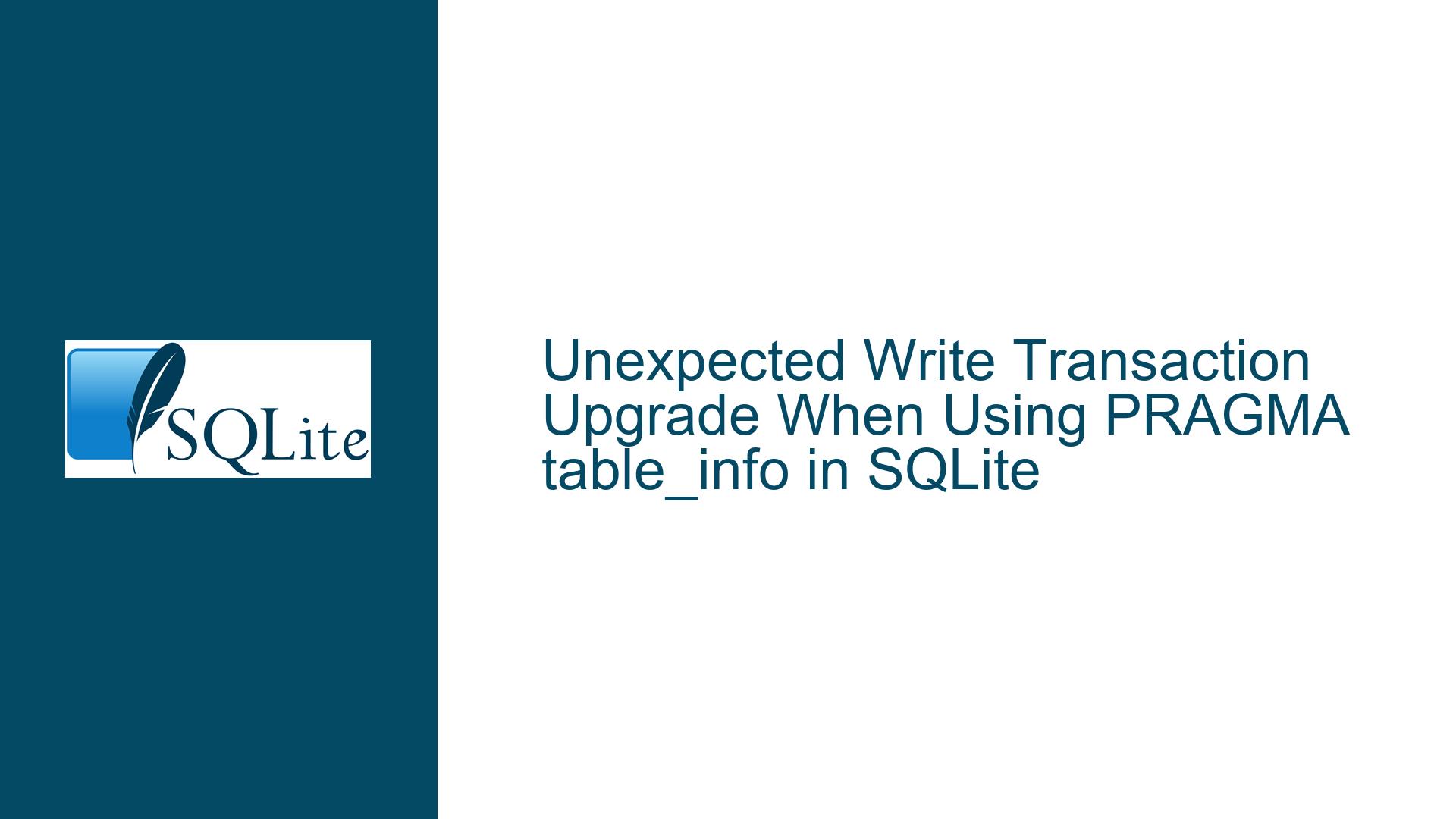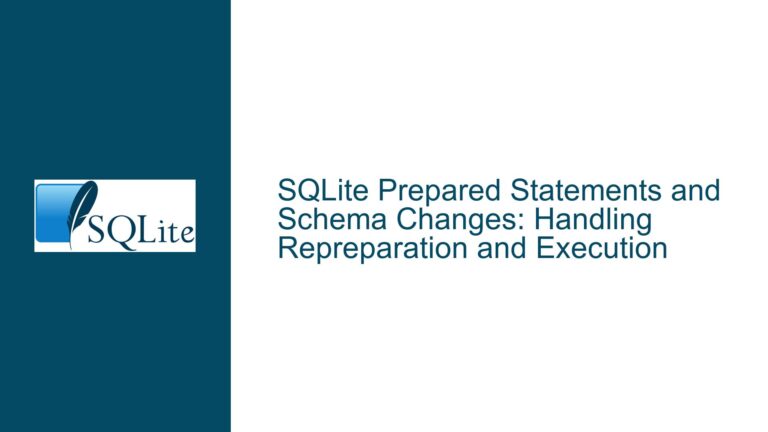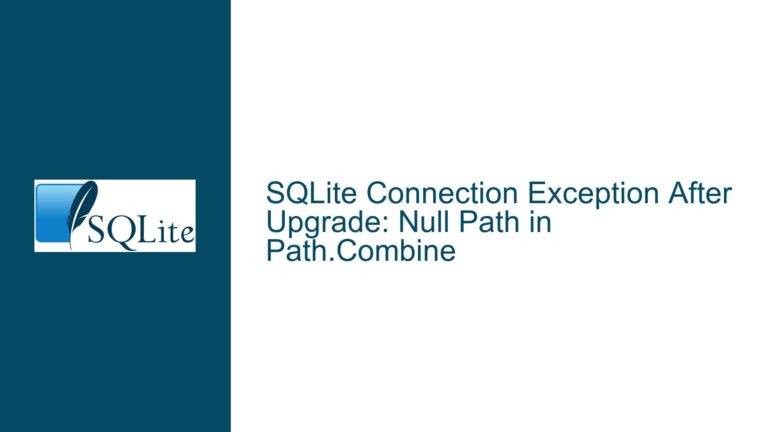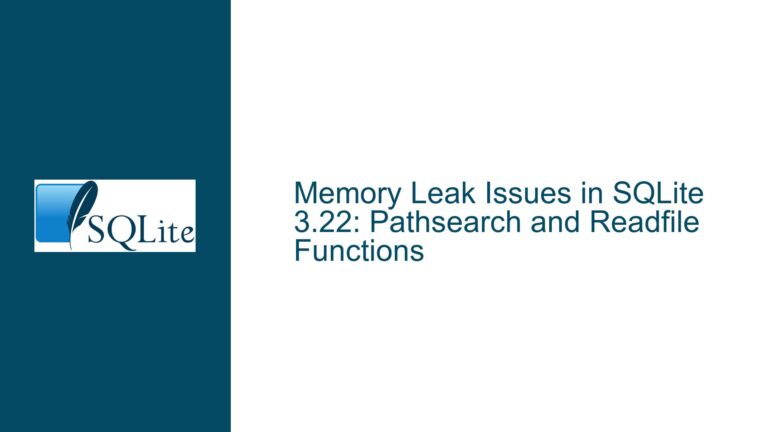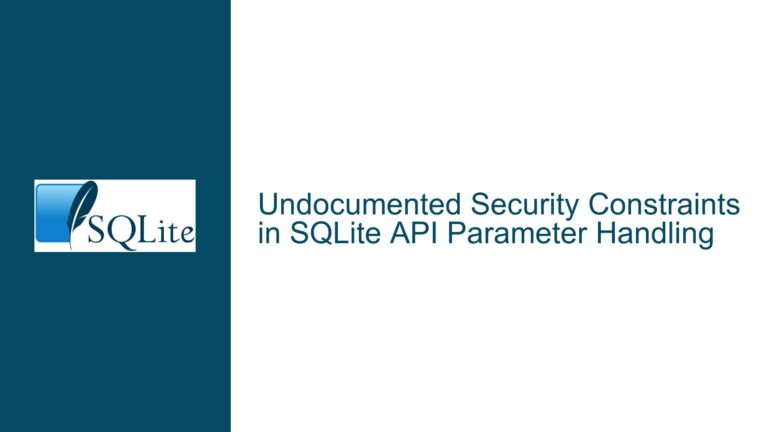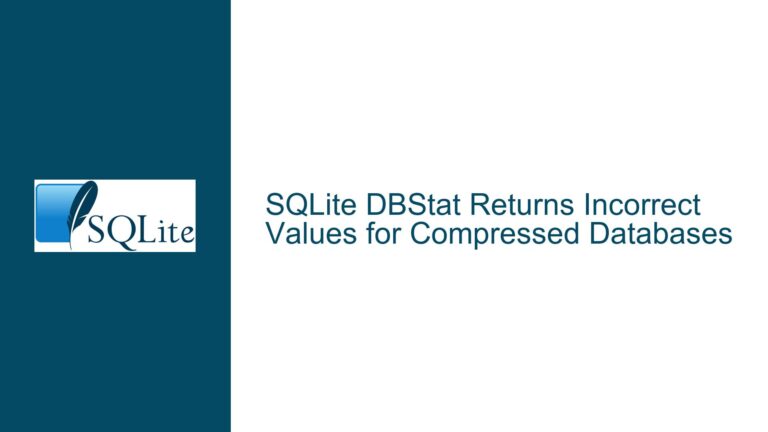Unexpected Write Transaction Upgrade When Using PRAGMA table_info in SQLite
Transaction Lock Behavior and PRAGMA table_info Interactions in SQLite
Issue Overview: PRAGMA table_info or pragma_table_info Upgrades DEFERRED Transactions to Write Mode
When working with SQLite transactions, developers often rely on the default DEFERRED transaction mode to optimize concurrency. A DEFERRED transaction begins as a read transaction and upgrades to a write transaction only when the first write operation (e.g., INSERT, UPDATE, CREATE TABLE) is executed. However, an unexpected behavior arises when using PRAGMA table_info or querying the pragma_table_info table-valued function: the transaction is upgraded to a write transaction even though these operations appear to be read-only. This violates the expected behavior of read-only schema introspection and introduces unintended locking consequences, such as blocking concurrent write operations from other connections.
The core issue revolves around SQLite’s internal handling of schema metadata queries. While PRAGMA table_info and its function-style counterpart pragma_table_info are designed to retrieve column details (e.g., data types, primary keys, nullable status), their execution under a DEFERRED transaction triggers an upgrade to a write transaction. This results in the acquisition of a RESERVED lock, which prevents other connections from initiating write transactions until the current transaction is committed or rolled back. The behavior is counterintuitive because querying schema metadata does not modify the database, yet it forces a transaction state change that impacts concurrency.
Possible Causes: Schema Metadata Access and Lock Acquisition Rules
The root cause lies in SQLite’s locking hierarchy and how schema metadata queries interact with transaction boundaries. SQLite uses a tiered locking system to manage concurrency:
- UNLOCKED: No locks held.
- SHARED: Allows concurrent reads but blocks writes.
- RESERVED: A write transaction is pending; allows other connections to retain
SHAREDlocks but blocks newRESERVEDorEXCLUSIVElocks. - EXCLUSIVE: The connection has exclusive access to the database.
In a DEFERRED transaction, the first operation determines the initial lock level. Read operations acquire a SHARED lock, while write operations acquire a RESERVED lock. However, schema metadata queries like PRAGMA table_info or pragma_table_info bypass this expectation due to their reliance on internal schema structures. Specifically:
Schema Version Validation: When querying schema metadata, SQLite checks the schema version to ensure consistency. This validation requires a
RESERVEDlock to prevent concurrent schema modifications during introspection. Even though the query itself does not alter the schema, the act of verifying its stability is treated as a write-like operation.Virtual Table Mechanism: The
pragma_table_infofunction is implemented as a virtual table. Virtual tables often require additional locks to maintain internal state consistency, especially when accessing schema-dependent structures. This implementation detail forces the transaction to upgrade toRESERVEDmode.Implicit Write Flags: Certain PRAGMA statements internally set flags that mark the transaction as writable. For example,
PRAGMA table_infomay trigger schema cache updates, which are treated as transient write operations.SQLite Version-Specific Behavior: Older versions of SQLite (prior to 3.34.0) had nuanced differences in how PRAGMA commands interacted with locks. Version upgrades or regressions could reintroduce this behavior.
Troubleshooting Steps, Solutions & Fixes: Resolving Lock Contention and Transaction Upgrades
To address the unexpected transaction upgrade, developers must reconcile SQLite’s locking semantics with their use of schema introspection commands. Below are actionable steps to diagnose and resolve the issue:
Step 1: Confirm Transaction State and Lock Acquisition
Begin by verifying the transaction state before and after executing PRAGMA table_info or pragma_table_info. Use the sqlite3_txn_state() API or monitor the database file’s lock status externally (e.g., using lsof on Linux or Process Explorer on Windows).
- Test Case:
BEGIN DEFERRED; SELECT * FROM pragma_table_info('my_table');If the transaction transitions to
RESERVEDafter theSELECT, the issue is confirmed.
Step 2: Use Explicit Read-Only Transactions
SQLite allows explicit read-only transactions using BEGIN READ ONLY. This prevents lock upgrades but restricts the transaction to read operations.
- Example:
BEGIN READ ONLY; PRAGMA table_info('my_table'); COMMIT;If the
PRAGMAsucceeds without upgrading the transaction, this confirms that read-only mode enforcesSHAREDlocks. However, this approach limits flexibility if subsequent write operations are needed.
Step 3: Replace PRAGMA with Direct Schema Queries
Avoid using PRAGMA table_info or pragma_table_info altogether. Instead, query the sqlite_master table and parse the schema manually:
- Example:
SELECT sql FROM sqlite_master WHERE type = 'table' AND name = 'my_table';Extract column details from the
sqlfield. This method avoids internal lock upgrades but requires parsing theCREATE TABLEstatement.
Step 4: Isolate Schema Introspection in Separate Transactions
Execute schema queries outside of write transactions to prevent lock contention. For example:
- Example:
-- Connection 1: Read schema details first PRAGMA table_info('my_table'); -- Connection 1: Start write transaction afterward BEGIN; INSERT INTO my_table (...) VALUES (...); COMMIT;
Step 5: Use WAL Mode for Concurrent Access
Enable Write-Ahead Logging (WAL) to reduce lock contention. In WAL mode, readers do not block writers, and vice versa.
- Example:
PRAGMA journal_mode = WAL;Note that WAL mode changes the locking mechanics, allowing
PRAGMA table_infoto coexist with write operations in other connections.
Step 6: Upgrade to SQLite 3.44.0 or Later
Recent SQLite versions (3.44.0+) include optimizations for schema metadata queries. Test whether the issue persists in the latest release.
Step 7: Use IMMEDIATE Transactions for Mixed Workloads
If the transaction requires both schema introspection and write operations, start with BEGIN IMMEDIATE to acquire a RESERVED lock upfront.
- Example:
BEGIN IMMEDIATE; PRAGMA table_info('my_table'); UPDATE my_table SET column1 = value1 WHERE ...; COMMIT;This avoids incremental lock upgrades and reduces the window for contention.
Step 8: Monitor Schema Changes with SQLITE_SCHEMA Error Handling
If the schema changes during a transaction, SQLite returns SQLITE_SCHEMA errors. Use retry logic to handle these cases gracefully.
Step 9: Profile Locking Behavior with Debugging Extensions
Use SQLite’s debugging extensions like sqlite3_stmt_status() or sqlite3_db_status() to track lock acquisition and transaction state changes programmatically.
Step 10: Avoid Virtual Table Functions for Schema Queries
Prefer the command-style PRAGMA table_info over the function-style pragma_table_info, as the latter’s virtual table implementation may have different locking side effects.
By systematically applying these strategies, developers can mitigate unintended transaction upgrades and maintain optimal concurrency in SQLite applications.
